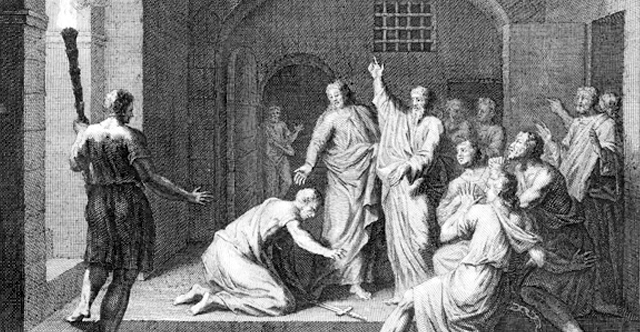
1
P
aul, a bond-servant of God and an apostle of Jesus Christ, for the faith of those chosen of God and the knowledge of the truth which is according to godliness,
Pavel, rob al lui Dumnezeu, şi apostol al lui Isus Hristos, potrivit cu credinţa aleşilor lui Dumnezeu şi cunoştinţa adevărului, care este potrivit cu evlavia,
2
i
n the hope of eternal life, which God, who cannot lie, promised long ages ago,
în nădejdea vieţii vecinice, făgăduite mai înainte de vecinicii de Dumnezeu, care nu poate să mintă,
3
b
ut at the proper time manifested, even His word, in the proclamation with which I was entrusted according to the commandment of God our Savior,
ci Şi -a descoperit Cuvîntul la vremea Lui, prin propovăduirea care mi -a fost încredinţată, după porunca lui Dumnezeu, Mîntuitorul nostru; -
4
T
o Titus, my true child in a common faith: Grace and peace from God the Father and Christ Jesus our Savior. Qualifications of Elders
către Tit, adevăratul meu copil în credinţa noastră a amîndorora: Har şi pace dela Dumnezeu Tatăl, şi dela Isus Hristos, Mîntuitorul nostru!
5
F
or this reason I left you in Crete, that you would set in order what remains and appoint elders in every city as I directed you,
Te-am lăsat în Creta, ca să pui în rînduială ce mai rămîne de rînduit, şi să aşezi presbiteri (Sau: bătrîni) în fiecare cetate, după cum ţi-am poruncit:
6
n
amely, if any man is above reproach, the husband of one wife, having children who believe, not accused of dissipation or rebellion.
Dacă este cineva fără prihană, bărbat al unei singure neveste, avînd copii credincioşi, cari să nu fie învinuiţi de destrăbălare sau neascultare.
7
F
or the overseer must be above reproach as God’s steward, not self-willed, not quick-tempered, not addicted to wine, not pugnacious, not fond of sordid gain,
Căci episcopul (Sau: priveghetor.), ca econom al lui Dumnezeu, trebuie să fie fără prihană; nu încăpăţînat, nici mînios, nici dedat la vin, nici bătăuş, nici lacom de cîştig mîrşav;
8
b
ut hospitable, loving what is good, sensible, just, devout, self-controlled,
ci să fie primitor de oaspeţi, iubitor de bine, cumpătat, drept, sfînt, înfrînat;
9
h
olding fast the faithful word which is in accordance with the teaching, so that he will be able both to exhort in sound doctrine and to refute those who contradict.
să se ţină de Cuvîntul adevărat, care este potrivit cu învăţătura, pentruca să fie în stare să sfătuiască în învăţătura sănătoasă, şi să înfrunte pe protivnici.
10
F
or there are many rebellious men, empty talkers and deceivers, especially those of the circumcision,
În adevăr, mai ales printre cei tăiaţi împrejur, sînt mulţi nesupuşi, flecari şi amăgitori,
11
w
ho must be silenced because they are upsetting whole families, teaching things they should not teach for the sake of sordid gain.
cărora trebuie să li se astupe gura. Ei buimăcesc familii întregi, învăţînd pe oameni, pentru un cîştig urît, lucruri, pe cari nu trebuie să le înveţe.
12
O
ne of themselves, a prophet of their own, said, “ Cretans are always liars, evil beasts, lazy gluttons.”
Unul dintre ei, chiar prooroc al lor, a zis:,, Cretanii sînt totdeauna nişte mincnoşi, nişte fiare rele, nişte pîntece leneşe.``
13
T
his testimony is true. For this reason reprove them severely so that they may be sound in the faith,
Mărturia aceasta este adevărată. De aceea mustră -i aspru, ca să fie sănătoşi în credinţă,
14
n
ot paying attention to Jewish myths and commandments of men who turn away from the truth.
şi să nu se ţină de basme evreeşti, şi de porunci date de oameni, cari se întorc dela adevăr.
15
T
o the pure, all things are pure; but to those who are defiled and unbelieving, nothing is pure, but both their mind and their conscience are defiled.
Totul este curat pentru cei curaţi; dar pentru cei necuraţi şi necredincioşi, nimic nu este curat: pînă şi mintea şi cugetul le sînt spurcate.
16
T
hey profess to know God, but by their deeds they deny Him, being detestable and disobedient and worthless for any good deed.
Ei se laudă că cunosc pe Dumnezeu, dar cu faptele Îl tăgăduiesc, căci sînt o scîrbă: nesupuşi, şi netrebnici pentru orice faptă bună.
 English
English
 Albanian - Shqip
Albanian - Shqip
 Arabic - العربية
Arabic - العربية
 Bulgarian - Български
Bulgarian - Български
 Chinese - 汉语
Chinese - 汉语
 English - English
English - English
 French - Français
French - Français
 German - Deutsch
German - Deutsch
 Italian - Italiano
Italian - Italiano
 Māori - Te Reo Māori
Māori - Te Reo Māori
 Portuguese - Português
Portuguese - Português
 Romanian - Română
Romanian - Română
 Russian - Русский
Russian - Русский
 Somali - Af Soomaali
Somali - Af Soomaali
 Spanish - Español
Spanish - Español
 Ukrainian - Українська
Ukrainian - Українська
 Vietnamese - Tiêng Viêt
Vietnamese - Tiêng Viêt
 Romanian
Romanian
 Albanian - Shqip
Albanian - Shqip
 Arabic - العربية
Arabic - العربية
 Bulgarian - Български
Bulgarian - Български
 Chinese - 汉语
Chinese - 汉语
 English - English
English - English
 French - Français
French - Français
 German - Deutsch
German - Deutsch
 Italian - Italiano
Italian - Italiano
 Māori - Te Reo Māori
Māori - Te Reo Māori
 Portuguese - Português
Portuguese - Português
 Romanian - Română
Romanian - Română
 Russian - Русский
Russian - Русский
 Somali - Af Soomaali
Somali - Af Soomaali
 Spanish - Español
Spanish - Español
 Ukrainian - Українська
Ukrainian - Українська
 Vietnamese - Tiêng Viêt
Vietnamese - Tiêng Viêt
